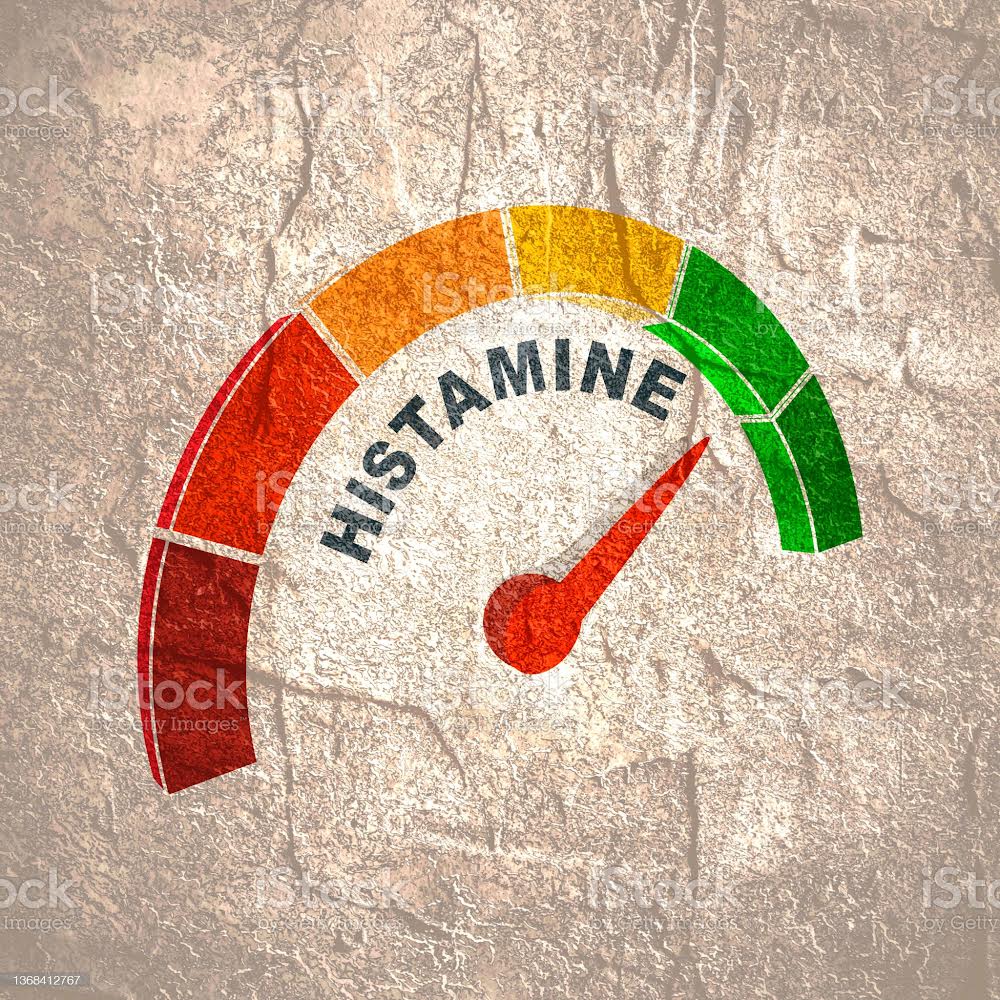
People who suffer from allergies understand how difficult it can be to manage the symptoms. Allergy symptoms can make you feel lousy.
Histamine is usually associated with allergy symptoms such as sneezing, runny nose, nasal congestion and skin reactions. What you may not know is that Histamine may also contribute to digestive symptoms. Common symptoms that may be, in part, due to histamine includes diarrhea, abdominal pain, heartburn and reflux (especially if sudden onset).
WHAT IS HISTAMINE?

Histamine is a biogenic amine produced by your immune cells and it has various effects in your body. It is produced by mast cells, basophils, and other cells in the body as part of the immune response to injury or infection.
Histamine plays a role in inflammation and is involved in allergic reactions. Histamine binds to receptors on cells as a part of an allergic reaction, causing dilation of blood vessels, increased permeability of blood vessels, and smooth muscle contraction. The result is symptoms such as itching, swelling, redness, and hives.
Histamine also has other functions in the body. It is involved in the secretion of stomach acid. It is also a neurotransmitter in the central nervous system. However, when histamine levels become too high or the body overreacts to its presence, it can lead to various allergic or inflammatory disorders and lead to Histamine Intolerance.
WHAT ARE THE SYMPTOMS OF HAVING EXCESS HISTAMINE RELEASE?
Symptoms associated with increased Histamine levels include allergy symptoms such as sneezing, itching and congestion.
Histamine can also cause other symptoms in the body including effects on digestion, mood and may even impact your hormones!
HISTAMINE AND DIGESTION
Some of the digestive symptoms Histamine may contribute to include loose stools, gas, bloating and heartburn. Other symptoms you may be experiencing may provide important clues that histamine may also be causing some of your digestive symptoms.
Other body symptoms that may also be a sign that Histamine may be causing some of your digestive symptoms include:
Consider the role histamine may be playing in your digestive symptoms, especially if you also experience other Histamine intolerance symptoms as listed above.
WHAT IS HISTAMINE INTOLERANCE?
Histamine Intolerance occurs when your body become sensitive to Histamine. People who are Histamine Intolerant (HIT) may release high levels of Histamine in their body and react with multiple symptoms. This is especially true if someone has a disrupted mucosal lining in their digestive tract. They may be more susceptible to the effects of Histamine. For those that have a disrupted lining and the overgrowth of yeast/ bacteria as well as an immune system that releases more Histamine, these reactions may become very problematic.
These high Histamine levels may come from eating a diet high in Histamine producing foods, from the presence of yeast or histamine producing bacteria in the digestive tract, or if there are low levels of an enzyme that breaks down Histamine in the digestive tract known as Diamine Oxidase
TREATMENT STRATEGIES TO REDUCE HIGH HISTAMINE AND REDUCE SYMPTOMS:
A low histamine diet may improve digestive symptoms if they are linked to high histamine. Fermented foods, chocolate, eggplant, olives, aged meats and spicy foods may be the most problematic foods for those who have high Histamine.
Your Naturopathic Doctor can work with you to develop an elimination and challenge program to identify the foods that may be triggers of high Histamine for you.
Bacteria or yeast in your digestive system are a big part of how histamine may build up in your intestinal tract. The overgrowth of bacteria or yeast leads to the fermentation of food, producing histamine. Histamine is a by-product of bacterial fermentation. Therefore, identifying and treating the overgrowth of microbes in the gut is an integral part of reducing histamine in the body. Your Naturopathic Physician can investigate whether your gut microbiome is contributing to high Histamine.
At Vitalia Health Care in Vancouver, our Naturopathic Doctors frequently recommend a test for Small Intestinal Bacterial Overgrowth and/or a STOOL TEST to identify possible yeast or bacterial overgrowth.
Supplements may also be beneficial in reducing the effects of high Histamine. Your Naturopathic Doctor can discuss what supplements may be appropriate for you.
Histamine is often overlooked as a possible underlying cause of digestive symptoms. The Naturopathic Physicians at Vitalia Health Care in Vancouver are trained in understanding how Histamine works in your body and how it may be involved in digestive symptoms.
Book an appointment today if you suspect Histamine may be contributing to your digestive symptoms
Dr. Tasreen Albhai N.D.

